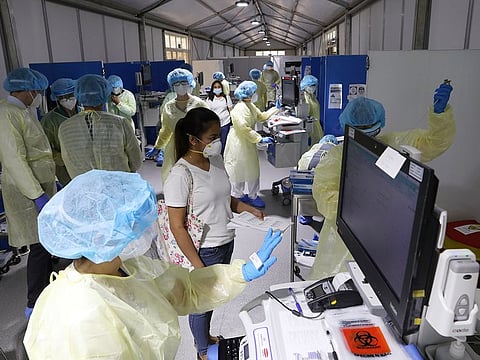Abu Dhabi entry: All you need to know about the EDE scans for COVID-19 screening
For Abu Dhabi residents returning to the emirate, health isolation guidelines will apply

Abu Dhabi: From Sunday, December 19 onwards, residents and visitors will once again be screened for COVID-19 before being allowed to enter Abu Dhabi entry. This time around, the screening will involve the use of EDE scanners, the Abu Dhabi Crisis, Emergencies and Disaster Management Authority announced on Wednesday.
The scanners are already used to ensure safe entry to a number of Abu Dhabi’s public venues, including malls, gyms, amusements parks, cinemas and even certain cafes and restaurants.
Ahead of the rollout of the new screening system, here is all that you need to know about it.
When does the new COVID-19 screening system come into effect?
It will be implemented from Sunday, December 19 onwards.
How has the border procedure changed?
Everyone entering Abu Dhabi will now need to undertake a simple, rapid EDE scan via a mobile scanning device used by the authorities.
What does an EDE scan involve?
An operator will hold up a mobile scanning device in front of you for several seconds.
How does the EDE scanner work?
EDE scanners use advanced technology to rapidly detect potential COVID-19 cases. They do so by measuring alterations in electromagnetic waves, using a smartphone connected to a sensor. Electromagnetic wave patterns change when RNA particles of the COVID-19 virus are present. The results of the scan are therefore near-instantaneous.
The screen on a scanner turns green to show that the person is healthy, whereas an alert in red appears to indicate a possible COVID-19 infection.
Will it store my image or personal information?
EDE scanners do not store your image or any personal information.
What happens if the scan detects a potential COVID-19 case?
You will be referred to an on-site testing centre to take a free COVID-19 antigen test.
What is an antigen test?
The antigen test detects the presence of antibodies that are produced by COVID-19. A nasal swab sample is collected to do the test and labelled with a dye.
Will I have to pay for the antigen test?
The antigen test is free of charge.
How long will it take to get the results of an antigen test?
Results for an antigen test will be received within 20 minutes.
Does the process apply to international travellers arriving from abroad?
The process applies to anyone arriving in Abu Dhabi from within the UAE.
What happens if my antigen test result comes back positive?
If you are an Abu Dhabi resident returning to the emirate, official health isolation guidelines will apply. You will be fitted with a wristband, and will need to spend your isolation period in your home or in suitable accommodation.
If you are not an Abu Dhabi resident, you will need to return to the emirate from which you departed, and notify the relevant health authority about your COVID-19 antigen test result.
Will I need to undertake an EDE scan if my Green Pass on Alhosn app is still valid?
Everybody entering Abu Dhabi emirate will need to undertake the EDE scan regardless of whether or not they have the Alhosn Green Pass.


